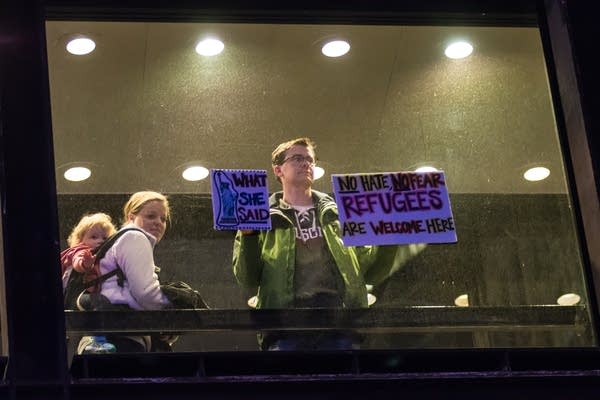Minneapolis pushes back against Trump's 'sanctuary cities' pressure

Go Deeper.
Create an account or log in to save stories.
Like this?
Thanks for liking this story! We have added it to a list of your favorite stories.
Minneapolis is pushing back against President Trump's executive order on immigration enforcement that threatens to withhold federal funds from so-called "sanctuary cities."
City Council members on Thursday received an update from a task force which did not recommend that the city soften its stance.
The phrase sanctuary city is at the center of a major political battle. But it's a term that has no legal definition, and it can mean different things to different people.
Under Trump's executive order called "Enhancing Public Safety in the Interior of the United States," so-called sanctuary cities or jurisdictions shield people who are here illegally. It says those cities "willfully violate Federal law."
Turn Up Your Support
MPR News helps you turn down the noise and build shared understanding. Turn up your support for this public resource and keep trusted journalism accessible to all.

"That's just not true. We are not violating federal law," said Minneapolis City Attorney Susan Segal.
Back in 2003, Minneapolis adopted a so-called separation ordinance that clarified its role in enforcing immigration laws.
Part of what the ordinance does is prohibit police and other city employees from asking about the immigration status of people unless it's clearly relevant to a crime being investigated by law enforcement, Segal said. They may also ask if it's required, like when employers' legal obligation to collect I-9 forms as part of a hiring process.
Minneapolis is prepared to join lawsuits filed by other cities and fight Trump's order in the courts. Segal said the Constitution's Tenth Amendment bans the federal government from commandeering local jurisdictions to enforce federal regulations. Seattle recently sued the government, citing that amendment.
The bulk of federal money that goes to Minneapolis is in the form of Community Development Block Grants. The nearly $15 million budgeted for this year is targeted to fund a variety of programs including community crime prevention, job training and housing.
The Minneapolis Police Department also receives about $1 million a year from the Department of Justice for a number of different public safety programs. Earlier this week, U.S. Attorney General Jeff Sessions warned that those dollars could also be withheld.
Shortly after that announcement, Minneapolis Police Chief Janee Harteau said the impact of losing that money would be significant. The department recently used grant money from the Community Oriented Policing Services program under the Department of Justice to help buy body cameras for its officers.

Still, Harteau said the warning doesn't mean Minneapolis is changing anything.
"We are not going to change the way we do business. It is not the role of local law enforcement to conduct immigration enforcement," Harteau said. "We need the people in our communities ... we need to have those relationships."
Harteau was speaking to an audience of several hundred people at a forum on police and community relations hosted by Minnesota Public Radio. She said that when police are seen as agents of immigration enforcement, members of immigrant communities become less likely to reach out to report crimes. That can leave many to live in fear and in silence.
Minneapolis is not standing alone. St. Paul Mayor Chris Coleman and Police Chief Todd Axtell have struck a similar tone. The city receives nearly $15 million annually from the federal government. However, Coleman has said he doesn't think the city is in jeopardy of losing the money, because it's not violating the order.
Immigration Customs Enforcement is calling out jurisdictions it calls "non-cooperative." Earlier this month, it put the Hennepin County Sheriff's Office on the list, claiming it released two Mexican nationals jailed for criminal offenses despite a hold request.
At a press conference, Stanek presented pictures showing the two men being released into ICE custody. The sheriff reiterated how he handles any hold requests from the agency.
"If ICE wishes a person remain in custody beyond the time he or she is scheduled for release, they must get a court order or they must pick that person up at the time of his or her release from the jail."
Stanek also said for him to hold someone without a judicial order is against the law. And he asked for an apology from ICE. A spokesperson for the Department of Homeland Security didn't apologize, but did push back against Stanek's claim that the holds are illegal.
Minneapolis is not the only city trying to ease the concerns expressed by members of its immigrant communities. City Council Vice President Elizabeth Glidden recently attended a conference in New York with elected officials from other cities across the country. Glidden said many cities are focusing resources on reaching out to immigrant communities to remind them of their rights. Some are exploring ways to make legal resources available.
"Some communities around the country — often these are little bit larger communities — are trying to identify ways to provide legal assistance, support," she said.
Minneapolis is also considering using a combination of city and private dollars for such a fund.


